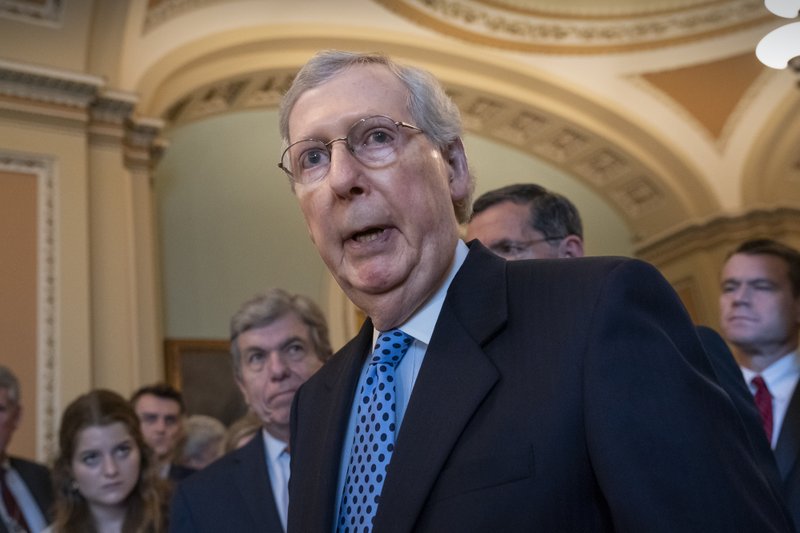WASHINGTON -- The top Republican and Democrat on a key Senate panel have agreed on a $4.6 billion measure to house and care for migrants that cross the U.S.-Mexico border -- as all sides work to avert a humanitarian crisis at crowded federal facilities in the southwest.
Sens. Patrick Leahy, D-Vt., and Richard Shelby, R-Ala., will unveil the measure at an Appropriations Committee session today, aides to the two lawmakers said. A bipartisan vote is expected, and both sides hope the measure can clear both chambers next week, just in time to replenish funding for federal humanitarian aid before it runs completely dry.
The legislation comes as record numbers of migrants are traveling to the border.
"This is a humanitarian crisis of gargantuan proportions. It needs to be dealt with, and I hope we're going to see a sign of bipartisan cooperation in the Appropriations Committee," said Senate Majority Leader Mitch McConnell, R-Ky.
Meanwhile, top-level negotiations over paying the country's bills and funding about $1.3 trillion in agency budgets are set to reconvene today.
The bipartisan budget talks are aimed at preventing automatic spending cuts that threaten the top priorities of both Democrats and Republicans. House Speaker Nancy Pelosi, D-Calif., and McConnell are taking the lead, along with Treasury Secretary Steven Mnuchin and White House acting Chief of Staff Mick Mulvaney.
Today's talks -- on legislation to set new "caps" on spending accounts controlled by Congress and also increase the government's so-called debt limit -- are intended to set a more orderly fiscal agenda that would permit relatively routine passage of spending bills and allow for consideration of the debt-limit legislation, which is required this fall to avert a default on U.S. obligations such as bond payments.
House Democrats are moving ahead with legislation that would allow for more spending on domestic programs than President Donald Trump has requested, while falling short of the amount he wanted for Pentagon funding.
Republicans have been exhibiting divisions on the budget, with pragmatists like McConnell and White House hard-liners like Mulvaney, a former tea party congressman, and budget director Russell Vought struggling to get on the same page. The talks come months after a 35-day partial government shutdown that occurred when Democratic lawmakers rebuffed Trump's border-wall demands.
McConnell is also a leading force in the budget and debt talks. House Democrats are going ahead with spending bills, but all sides are working on a separate track to strike a deal on the overall amount of money to be allocated for defense and nondefense appropriations this year.
Without an agreement, another round of automatic cuts to government spending, called sequestration, would strike early next year, cutting $70 billion from current levels for the military and another $55 billion from nondefense programs.
The muddled picture has sparked concerns of another government shutdown, the return of an automatic $125 billion in spending cuts to the Pentagon and domestic agencies, and a first-ever default on U.S. government obligations such as interest payments.
"Our guys are going to have to be flexible going in, the president's going to have to be flexible if he wants to get his defense number, and obviously he's going to have to work with the Democrats on some of things they want to get done," said John Thune of South Dakota, the Senate's No. 2 Republican.
A floor vote is also expected today on a $1 trillion House spending bill that sets out a marker by Democrats for the upcoming negotiations of the line-by-line spending bills required to fund the government. The Senate has yet to begin its work on the legislation because McConnell and Senate Appropriations Committee Chairman Richard Shelby, R-Ala., are seeking an overall broad agreement on the "top line" figures for both the Pentagon and domestic programs.
The House bill blends military spending dear to Republicans with education, health, and energy and water programs that enjoy bipartisan support. But the measure far exceeds Trump's budget request for domestic programs and contains policy "riders" related to abortion and other hot-button issues that could drive away any potential GOP support, though Democrats sidestepped a divisive battle over taxpayer-financed abortion.
The bill wraps four of the 12 annual spending measures into one, and Democrats are boasting of gains for the early-childhood education program Head Start, for health research and for fighting the opioid epidemic, among the myriad programs covered by the measure. It also has provisions to block Trump from reassigning military appropriations to fund his border wall, and it contains significantly more money for family planning, preschool education and child care.
A Section on 06/19/2019
